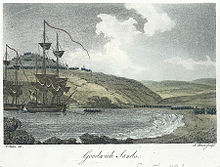
Back Фішгардскі дэсант Byelorussian Фишгард десанчĕ CV Brwydr Abergwaun Welsh Bataille de Fishguard French Desant pod Fishguard Polish Batalha de Fishguard Portuguese Фишгардский десант Russian
This article needs additional citations for verification. (February 2020) |
| Battle of Fishguard | |||||||
|---|---|---|---|---|---|---|---|
| Part of the War of the First Coalition | |||||||
 Goodwick sands French troops surrender to British forces James Baker, 18th century | |||||||
| |||||||
| Belligerents | |||||||
|
|
| ||||||
| Commanders and leaders | |||||||
|
| ||||||
| Strength | |||||||
|
| ||||||
| Casualties and losses | |||||||
| Light |
| ||||||
Location within the United Kingdom | |||||||
The Battle of Fishguard was a military invasion of Great Britain by Revolutionary France during the War of the First Coalition. The brief campaign, on 22–24 February 1797, is the most recent landing on British soil by a hostile foreign force, and thus is often referred to as the "last invasion of mainland Britain".
The French general Lazare Hoche had devised a three-pronged attack on Britain in support of the Society of United Irishmen. Two forces would land in Britain as a diversionary effort, while the main body would land in Ireland. Adverse weather and ill-discipline halted two of the forces but the third, aimed at landing in Wales and marching on Bristol, went ahead.
After brief clashes with hastily assembled British forces and the local civilian population, the invading force's Irish-American commander, Colonel William Tate, was forced into unconditional surrender on 24 February. In a related naval action, the British captured two of the expedition's vessels, a frigate and a corvette.
- ^ James. James' Naval History. pp. 95–96.
